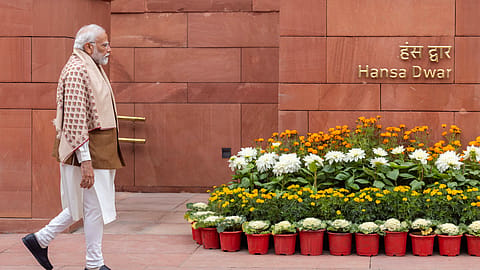India-UAE ties may make tough calls difficult for India at Abu Dhabi WTO Ministerial: Expert
Prime Minister Narendra Modi is currently on a visit to Abu Dhabi.

Even as Prime Minister Narendra Modi termed his meeting with the President of the United Arab Emirates (U.A.E.) and ruler of Abu Dhabi Sheikh Mohamed bin Zayed Al Nahyan on February 13 as excellent, the bonhomie could make it difficult for India to outrightly reject any proposal that may not be in its interest at the World Trade Organisation (WTO)'s forthcoming 13th Ministerial meeting (MC13) at Abu Dhabi taking place from 26 to 29 February 2024.
Modi, currently on a visit to Abu Dhabi, had posted on social media platform X, that "India-UAE friendship is growing stronger and stronger, greatly benefitting the people of our nations". The cordial relationship could put India under pressure as the country which hosts WTO Ministerial would always want the conference to result in productive outcomes. MC13 will see trade Ministers from member countries across the world attending it to review the functioning of the multilateral trading system and to take action on the future work of the WTO. Dr Thani bin Ahmed Al Zeyoudi, U.A.E.'s Minister of State for Foreign Trade is the chair of the conference.
"This WTO meeting is hosted by Abu Dhabi and India has been building strong relationship with U.A.E. We have a Free Trade Agreement (FTA) with UAE. Prime Minister is not only visiting Abu Dhabi but also flying down to Doha, Qatar, another country that is part of the Gulf Cooperation Council (GCC). Perhaps it is meant to acknowledge the gesture of the Qataris to release our ex-officers of Indian army and Navy. Considering all this, there may be some amount of pressure on India to not stick out our neck and oppose things if it is the only country, or just a handful of countries, to oppose any proposals that are considered at WTO. This pressure will be there on India," Jayant Dasgupta, former Indian Ambassador to the WTO observes. According to him, an agreement on Fisheries subsidies is likely to be the most probable outcome of MC13 as global economic conditions are not conducive for most countries to take major decisions or offer major concessions to further trade liberalisation.